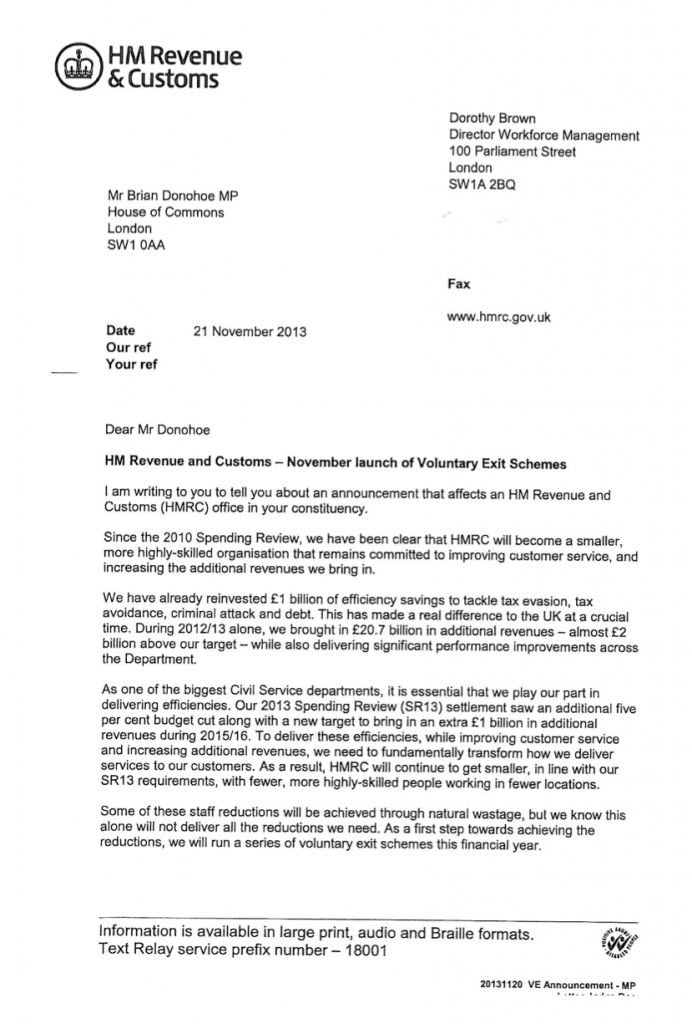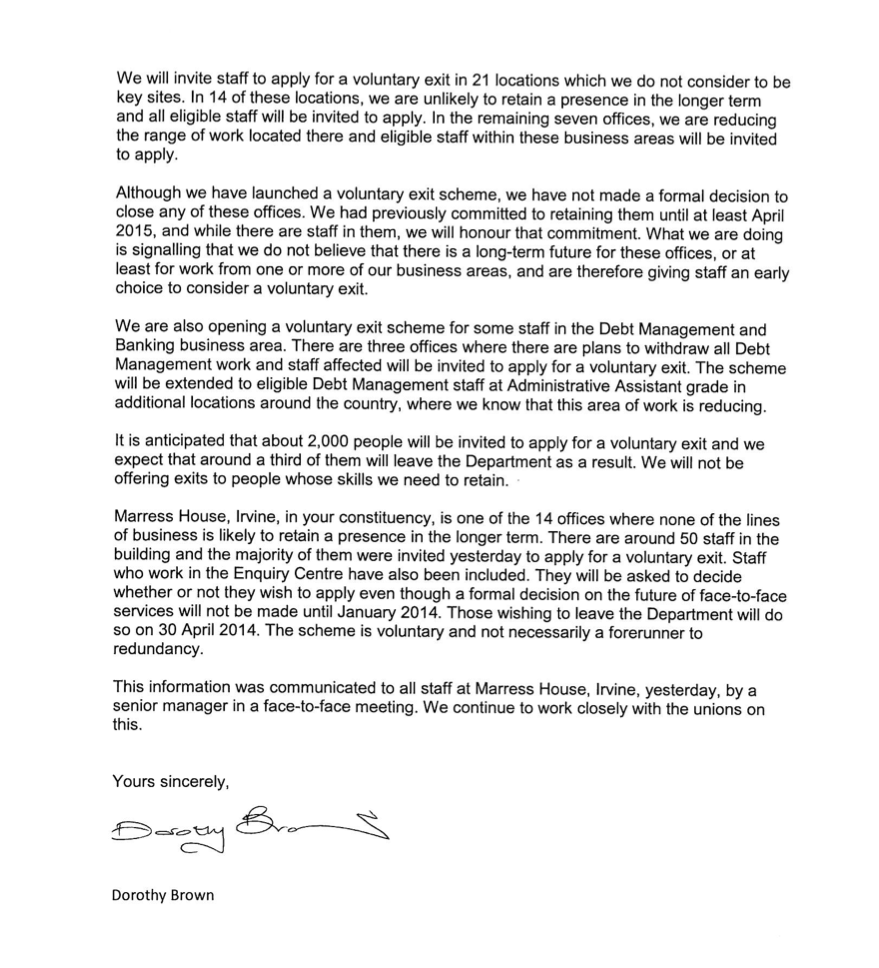It was said in the autumn statement that the HMRC budget was being protected from cuts. That must come as news to many in HMRC because right now thousands at 21 locations are being invited to leave the department. This copy letter, reproduced with permission, explains why:
Dorothy Brown has, I know, been busy with these letters, which have gone to quite a number of MPs; all those in the 21 locations affected in fact.
But what this says is HMRC is withdrawing from many parts of the country and dispensing with at least another 2,000 staff - all of whom could be tackling the tax gap and will instead be doing something else.
The cost to society is large. The personal cost to those involved is enormous. The loss of tax revenue will be huge. And all this is driven by dogma, not logic.
I'm proud to support PCS staff in their fight to stop these redundancies.
Thanks for reading this post.
You can share this post on social media of your choice by clicking these icons:
You can subscribe to this blog's daily email here.
And if you would like to support this blog you can, here:





It’s unfortunate that Dorothy doesn’t provide any information in this letter about how HMRC are going to ‘fundamentally transform how we deliver services to our customers’ with such a rapidly shrinking head-count, Richard. I sincerely hope it doesn’t rely on new IT systems, otherwise it shows that little has been learnt by HMRC management from the underperformance (to put it politely) of the many IT projects that they’ve put so much faith in over the last decade and more. Sadly, I suspect it does and that the snake oil salesman of the IT world have been spinning their tales of the miracles of new technology to HMRC managers desperate to hit their efficiency savings’ targets, and thus keep the HMRC Board and Treasury happy, while diverting even money public money into the coffers of the private sector. It’ll be a prosperous Xmas for some, that’s for sure.
Automated telephone call systems will be the first change
Well done Richard and thank you – but I am not optimistic that HMRC or the Treasury will listen to what is plain common sense. East Anglia is another area of the country where the HMRC presence will be highly diluted – yet local knowledge is a huge advantage to us in our compliance work.
I am only too well aware of it
A proud tradition of service to East Anglia will be lost
Dorothy Brown has now been put in charge of Personal Tax Operations which is where the vast majority of these cuts are to apply. Take it from me – these are office closures in all but name and we shall hear more in February when the main announcement is made re locations and the future of our enquiry centres which are all expected to close from April 2014. The whole “eggs in one basket” strategy is around “digital by default” with agents, business and members of the public all expected to ring us up (good luck with that one!) or contact us by electronic means. As per usual HMRC are seeking the savings before the strategy has been introduced let alone proven to work. By 2020 there is likely to be no tax presence at all in the West Country south of Bristol.
Agreed
Paul
Nearly two years ago now two members of a team I was leading at the time, which was evaluating a range of ICT and social exclusion projects, attended a networking/info exchange workshop at the EC in Brussels which focused on “digital by default”. There were about 40 people there from across the EC and I can tell you that my colleagues were the only ones who warned against the assumptions and philosophy that underpin this latest infatuation of government with new technology.
Put bluntly but accurately, that philosophy is that anyone who can’t or won’t use new technology to interact with government/public service – regardless of the reasons – can go hang themselves (and in some cases, sadly, that will actually happen, I’m sure).
The reason this view has become dominant is quite simple: almost everyone involved has a techie background, which unfortunately means that their awareness of issues beyond the technology is badly lacking (with some exceptions, of course). And the few people that are not techies are too scared for their jobs to dissent from the technological determinism that’s dominated many policy domains for years (witness IDS and the universal benefit farce). When this technological utopianism aligns with the values of politicians who want to shrink the size and cost of government and public service, but who are largely ignorant about new technology, it becomes a very dangerous mix. We saw it previously in the early 1990s with the obsession with “reengineering” organisations – again based largely on unproven claims and generalisations about the transformational nature of ICT.
Unfortunately I can offer no happy ending on this one. The practice and PR of Digital by default is sweeping all before it, and when it’s run its course there will be many millions of mainly poor and elderly people who are even more excluded from access to public services than they are now. For others, such as the few remaining public servants who have to cover for the shortcoming of the technology, such as staff at HMRC (though not senior management, who’ll be rewarded handsomely for “delivery”), life will be a whole lot tougher.
I think hardly anybody in HMRC or Cabinet Office senior positions has a techie background. These are decisions being made by non-techies.
Iain. Not so long ago there used to be a few people in the Cabinet Office who had techie background, though my understanding was they were actually well aware of the limitations. That said, that doesn’t alter the point I was making. Digital by Default was the brainchild of techies (or maybe one techie in particular, if my memory serves me correctly). It was their response to the policy level demand from government ministers (generally non techies, as you say) – filtered down through senior managers (generally also non techies, as you say) tasked with “delivery”, to reduce public spending, and downsize government and public services. In other words it is a technological solution to a series of problems that cannot be addressed solely by technology, whatever some might like to imagine or claim.
These closures are utter madness. Taxation is a people business. I grant that Technology has improved HM Revenue & Customs operations,online submission although using bizarre methodology,was a change for the better. But a business product is not being sold (I keep telling HMRC officers taxpayers are not Customers!), it’s a Social
Responsibility. If people are going to comply with a Social Responsibility then there has to be human interaction both for access to the system for people who wish to be compliant and local knowledge to chase those who don’t wish to be compliant.
Agreed, wholeheartedly
Stephen. Back in the mid to late 1990s, through to the early 2000s, many of the leading academics in political science consistently pointed out why when it came to a range government-citizen interactions and the provision of public services, citizens could not and should not be reduced to the role of ‘customers’. I think that debate slowed developments down somewhat (for example, the Major government actually published a document called a “citizens’ charter”, though the conception of citizens it was rather narrow), but I’m afraid that once New Labour came into office the floodgates opened. We now have a generation of public servants who are entirely “customer focused” and completely or largely unaware that that form of relationship is not appropriate in the context of a whole range of public services, and, worse still, skews the structure, operation and management of the organisations in which they work.
Agreed
I know of almost no one who engages with HMRC who thinks themselves a customer
A customer typically pays for something be it a service or a good. So the question is that if we are a customer then what are are we receiving in return?
I would suggest that indirectly what we receive in return – albeit from different departments of government – is all the services, infrastructuire etc. that Richard always points to as to why companies should pay tax. So to that extent we are all – individuals and companies alike – a customer of the government adn hence of HMRC.
The problem is we just don’t associate our paying of tax with the services and benefits we receive in return adn so donlt see oursleves as customers of HMRC, i.e. the government. And I am just as guilty, I don’t think of myself as a ‘customer’ of HMRC.
If that perception could be changed then people/companies might be ‘happier’ to pay tax. Then again …